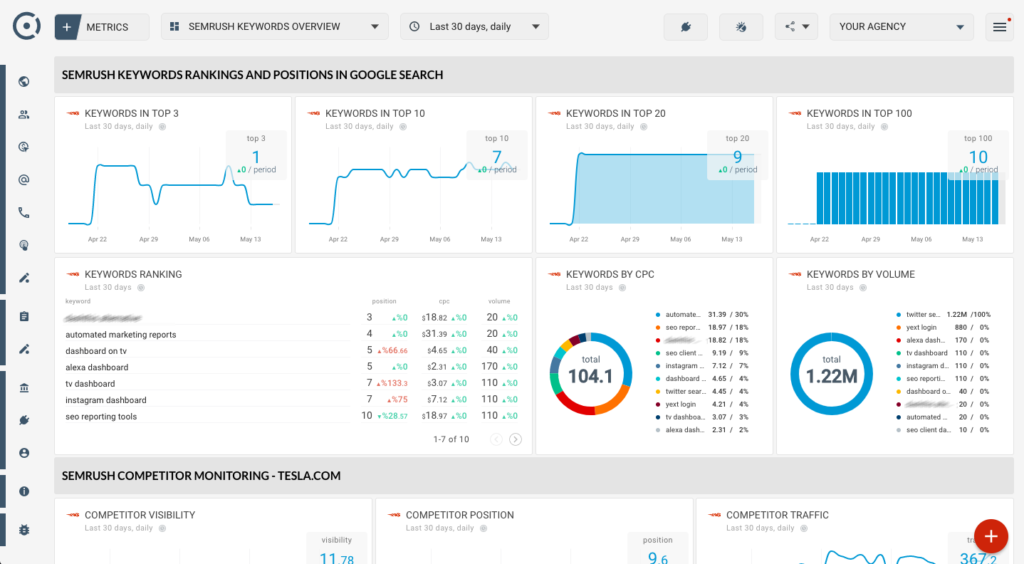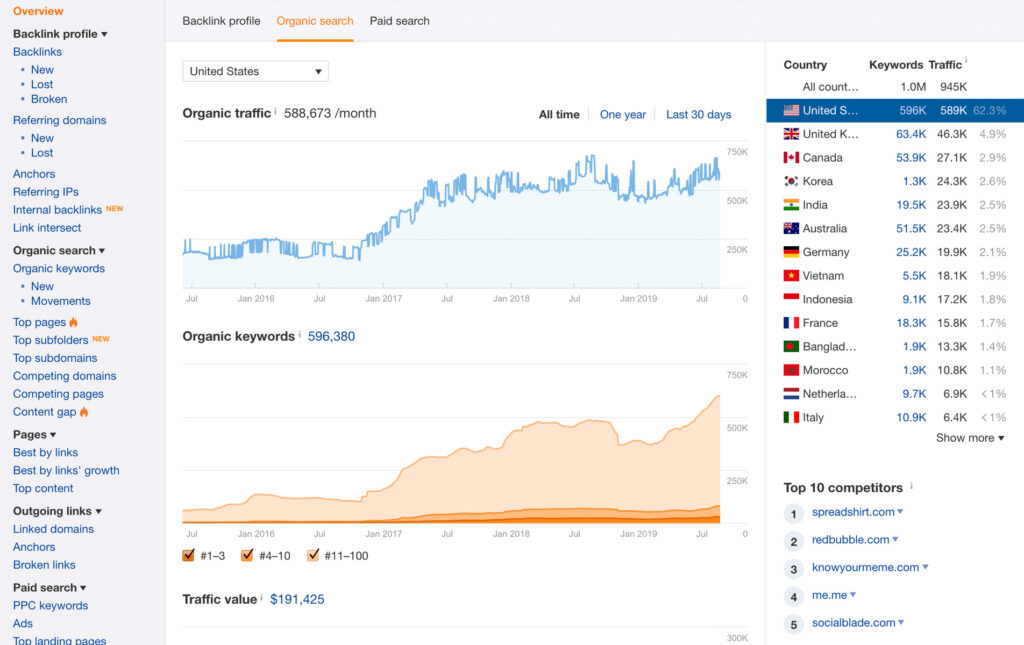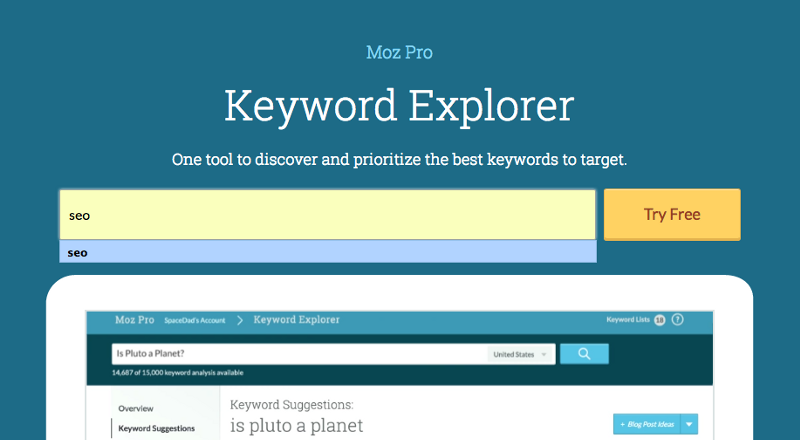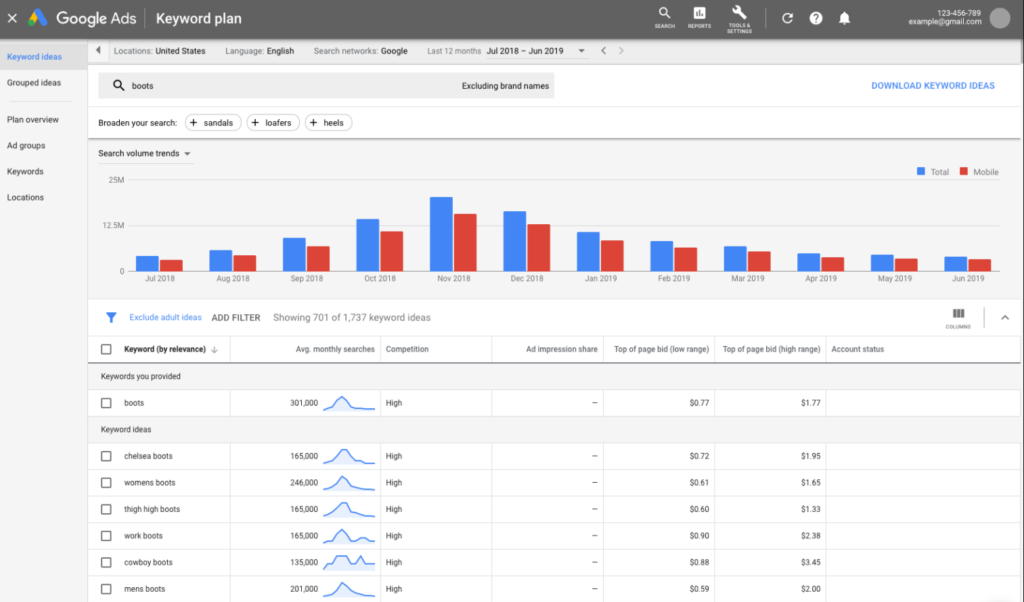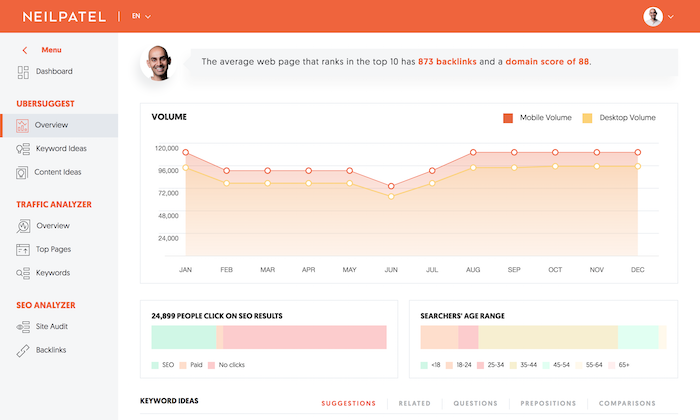You might not worry that much about your blog’s, or social channel’s search engine ranking while doing it as a hobby. But, if you want to earn money through affiliate marketing, you need to spend some time working on your page’s SEO. And most importantly – your keywords.
Depending on the keyword research, your newest article might land at the top of search results or somewhere on the fifth page. And having millions of keywords to choose from doesn’t make ranking high easier.
However, there’s a couple of handy tools that you can use to make keyword researching a bit easier – and far more effective. That’s why we have picked 5 top tools, not only for affiliate marketing, but for any and all of your keyword needs. In this article, we will list both free and paid tools. So, without further ado, let’s have a look at those tools, shall we?
What keywords should you be looking for?
If you want people to find your content easily and buy the products you promote, you have to focus on the keywords you use, and how easy it is to rank highly for those.
With the tons of content created every day, your article or video might get buried without carefully chosen keywords. So, you should be looking for keywords relevant to the promoted product or service that people often type into the search box. In addition, it’s worth focusing mainly on high intent keywords. These keywords indicate when searchers are close to buying a product or service if they see it matches their needs.
That’s a lot of requirements, right? So why is that even that important? Here’s an example.
You are creating a review for your beauty and makeup blog. Let’s say it will be about face cream. Of course, it would be ideal if people could find your article by simply typing the phrase “face cream.”
But now, put the term into Google search – you’ll get around 1,810,000,000 search results. Yes, one billion eight hundred ten million results. And looking just at the first page, all results lead to websites of well-known brands with a much bigger budget than you possess. Competing with them is most likely out of the question.
But, here’s the trick – with long-tail keywords, you can find a niche for yourself even in very crowded search areas. Long-tail keywords are phrases between three and six words that focus on a specific niche and, as such, are searched less often. But that’s not a bad thing, quite the opposite – because they are used less often, it’s much easier for you to rank high with them. So, for example, let’s say that instead of the broad “face cream” keyword earlier, you used a “Face cream for sensitive skin with SPF” keyword (because that’s the product you are reviewing).
That narrows down the search engine results to “only” around 107,000 pages, making it easier for people who may be looking for this type of product to find your review. (And maybe purchase the promoted product as well!)
Top 5 keyword research tools for your research needs
Now that we know what we should look for, it’s time to think about searching for those keywords. You could simply type them into the search engine? That might give you some ideas for new content, but how will you know if you can rank high with them?
For this, you need a clever keyword research tool that will both suggest new keywords to use, and show you which of the suggestions can give you the best results. Additionally, you will learn which ones are often used by people from similar industries as you.
Below, you will find, compiled by us, a list of 5 keyword research tools that are often mentioned as “top choices” for marketers and content creators. We included both the powerful (but expensive) all-in-one platforms but also some free ones as well. Hopefully, you can find a suitable tool, regardless of whether you are just starting out with affiliate marketing, or have years of experience already.
SEMrush
SemRush is one of the “big boys” on the SEO market. Not only is it a tool for researching keywords, but the platform also has so many features that you can use it for affiliate marketing and social media, or content marketing activities.
The best feature? Instead of giving you a long list of keyword ideas for whichever term you entered, SEMrush will show you keywords your competition is using, together with the search volume and competition for that keyword. This will help you find out how well your competitors are doing and which keywords you should be aiming for.
Main features:
- Detailed analysis of any keyword you type – from search volume and competition on the keyword, to complete historical data about the popularity of the keyword.
- On-page SEO audits
- Analyzing any domain’s backlink profile and keywords used.
- Several tools to improve your content’s power and reach
- Analyzing traffic and audience of your competitors’ websites
And this is only the start of what this platform can do – want to monitor how your (and your competitors’) website’s ranking is doing? Or maybe work more on your website’s backlinks? You’ll surely find a feature that can help you do just that.
Pricing: SEMrush offers three pricing plans, with the most basic plan (Pro) costing $99 a month. SemRush claims this plan is best suited for small companies or freelancers. The Guru and Enterprise plans are respectively $191 and $374 a month when paid annually. There is also a 7-day free trial available, but you need to enter your credit card details to gain access to it.
Ahrefs
If you were ever trying to research keywords or learn more about your page’s SEO, then you more than likely will have heard e about Ahrefs. It was mainly known as a link-building tool in the past, and it couldn’t do much besides that. Ahrefs is one of the most powerful SEO platforms with everything you might ever need to make your content and website rank as highly as possible.
Main features:
- Precise keyword difficulty score measurement
- Keyword research for ten search engines (including Yandex and Baidu)
- Showing the estimated number of clicks on the keyword
- Daily updated backlinks popularity graph
- Detailed SERP history for any keyword
Pricing: Whilst Ahrefs can give you substantial amounts of data, it comes in at quite a high price. The cheapest Lite plan costs $82 per month when paid annually, and it only allows for one user at a time – every additional seat is an extra $300. For advanced and agency plans, the price can rise to $332 and $832 a month, respectively. Ahrefs, like SEMRush, has a seven-day trial for lite and standard plans, though in this case, the trial unfortunately isn’t free, and costs $7.
Moz Keyword Explorer
The previously mentioned tools are two of the most powerful and most expensive available on the market, so let’s look at something a bit cheaper and easier to use. Moz Keyword Explorer comes in two versions – a free version that is available straight on their website or from a browser add-on, and paid all-in-one SEO solution.
Showcasing their unique feature, Moz utilizes a keyword difficulty score called “Priority”, which adds the CTR (click through ratio), search volume and PPCs (pay per click ads) score to help you find the most relevant keywords for your new content even faster.
Main features:
- Moz’s organic CTR and Priority score metrics
- Easy to generate and save keyword lists
- Long-tail keywords and question phrases search
- Detailed SERP analysis breakdown
Pricing: For the free version, you either need to have an account on their website (that gives you ten free queries a month) or download their free Chrome add-on plugin. Keep in mind, though, that the free plugin doesn’t show the Keyword Difficulty score for the search terms. The paid plans start from $79 a month for the Standard plan to $479 for Premium (paid annually). All plans include a pro version of their SEO website plugin.
Google Keyword Planner
Google Keyword Planner is a good option for people who are just starting out with affiliate marketing. Businesses who don’t have a large budget for reputable tools or aren’t sure whether affiliate marketing is worthwhile can also use it. Whilst this is a pretty simple keyword research tool compared to other platforms above, the results come straight from the Google search engine. It means you can count on the results being as accurate as possible.
Main features:
- Comparing keyword popularity in a given time
- Showing amount of mobile searches for each keyword
- Average monthly searches divided on devices used
- Discovering the main keywords your competitors are using.
Pricing: Google Keyword Planner is entirely free to use. All you need to do is to create a Google Ads account, and then you can use the Keyword Planner tool through it.
Ubersuggest
Ubersuggest is a free SEO tool from the mind of Neil Patel. Using it, you can get new keyword suggestions and learn how difficult it could potentially be to rank for them. But that’s not all that the tool offers. You can find out where your traffic is coming from, and even look up the table of the 100 top Google results for a given keyword, together with plenty of data available on those results.
Main features:
- Top-performing content for particular keywords
- Showing device search volume, type of search, and age range of each searcher for a given keyword.
- Competitor Domain Overview
- Top SEO Pages
- Backlink building tool
Pricing: Ubersuggest has both a free and paid version. With the free version, you have three daily searches available. If you sign into Ubersuggest with your Google account, you’ll also get more keyword suggestions and personalized SEO suggestions. But Neil Patel also offers a paid version of Ubersuggest – starting from $12 a month for individuals to $40 a month for agencies.
Conclusion
If you want your content to rank, spending time researching the best keywords for your newest article or video tutorial is a must. And to find these aforementioned keywords faster and easier, have a look at one or more of the keyword research tools above. If you are just starting out with affiliate marketing, picking the free or freemium tools is a good idea, as you won’t find yourself tied into any tool for a set period of time.
In the end, if you require a robust set of tools not only for affiliate marketing, but for other parts of your business as well, then it’s definitely worth trying out one of the “bigger” platforms. As all of them have a trial version, it’s a good idea to take them for a test ride first, and see which ones closest fit your marketing style.
Share this article
The leader in Affiliate software
Post Affiliate Pro offers a comprehensive affiliate software platform to manage multiple affiliate programs with ease. Enjoy no setup fees, 24/7 customer support, and a free 1-month trial. Ideal for small and large businesses, it features precise tracking, automated workflows, and customizable tools to boost your affiliate marketing success. Try it now and streamline your affiliate operations effortlessly!
How to choose affiliate software
Discover how to choose the best affiliate software with Post Affiliate Pro's comprehensive guide. Learn about essential features like tracking, fraud prevention, and customizable commission types, all designed to optimize your affiliate programs. Ensure seamless operations with easy setup, mobile access, and outstanding support to save time and build trust with affiliates. Visit our guide to make informed decisions and boost your affiliate marketing success!
9 affiliate marketing tools that’ll help you run your affiliate program
Discover 9 essential tools to supercharge your affiliate marketing program! From visual content creation with Visme to comprehensive management with Post Affiliate Pro and audience insights via Smartlook, these tools will boost your sales and refine your strategy. Dive in to maximize your affiliate success!
Explore Post Affiliate Pro's comprehensive Affiliate Marketing Glossary to enhance your industry knowledge with easy-to-understand definitions of essential terms. Perfect for marketers seeking to understand the fundamentals and advanced concepts, this glossary helps you master the language of affiliate marketing. Visit now to boost your expertise!

